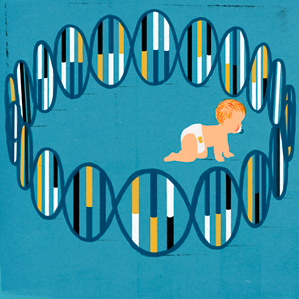Razib Khan recently has the genome of his child fully sequenced even before the baby was born.
Khan, graduate student at the University of California, Davis, and blogger at The Unz Review, decided that he wanted detailed genetic information on his child as soon as he knew that his wife was pregnant. After a genetic test for chromosomal abnormalities he asked to have the DNA sample back and managed to have the baby's genome sequenced on one of the University NGS instruments.
 MIT technology review reports about the whole story and Khan tells on the many difficulties he faced to have the genome sequencing done. Most of the medical staff tried to discourage him from performing this kind of test, afraid that the couple could take irrevocable decisions, such as pregnancy termination, based on the presence of putative deleterious mutations in the baby's genome. This case raised again the question of how much information could be extracted from a single genome, which part of this information is really useful on a medical care basis and which part is actionable in nowadays.
MIT technology review reports about the whole story and Khan tells on the many difficulties he faced to have the genome sequencing done. Most of the medical staff tried to discourage him from performing this kind of test, afraid that the couple could take irrevocable decisions, such as pregnancy termination, based on the presence of putative deleterious mutations in the baby's genome. This case raised again the question of how much information could be extracted from a single genome, which part of this information is really useful on a medical care basis and which part is actionable in nowadays.
It seems to me that by now our ability to robustly correlate genotypes to phenotypes is still scarce. This is due to incomplete knowledge about causative and risk associated mutations as well as on the molecular and genetic mechanisms that lead from genetic variants to phenotypes. Studies in the last years have demonstrated that this path is not straightforward and the actual phenotypes often depend on the interaction of several genetic components and regulatory mechanisms, living aside the environmental factors.
Several disease mutations show incomplete penetrance and many example exist of variants linked to phenotypes only in specific populations, so a reliable interpretation of genomic data seems far away by now.
 However, many decision can be made knowing your DNA sequence and this information will become even more interesting as researchers continue to find new associations and elucidate genotype-phenotype correlation mechanisms.
However, many decision can be made knowing your DNA sequence and this information will become even more interesting as researchers continue to find new associations and elucidate genotype-phenotype correlation mechanisms. Moreover, if the health public service continues to stand against whole genome screening, people will soon turn to private companies, that can already provide this kind of services. This policy will thus increase the risk of incomplete or misleading interpretations without any kind of support from medical stuff.
A lot has to be discussed on the practical and ethical point of view, but we have to face the reality that since these kind of tests are going to became easily accessible in the near future, we have also to find a way to provide the correct information to the subject analyzed.
The topic of genomic risk assessment in healthy people has been recently discussed also on the New England Jornal of Medicine, that published a review on clinical whole exome and whole genome sequencing. The journal also presented the hypothetical scenario of a subject which discovers some cancer affected relatives and wants to undergo genetic testing. They propose 2 strategies, gene panel or whole exome/genome sequencing and the case is open for readers to comment with even a pool to vote for your preferred solution.
The topic of genomic risk assessment in healthy people has been recently discussed also on the New England Jornal of Medicine, that published a review on clinical whole exome and whole genome sequencing. The journal also presented the hypothetical scenario of a subject which discovers some cancer affected relatives and wants to undergo genetic testing. They propose 2 strategies, gene panel or whole exome/genome sequencing and the case is open for readers to comment with even a pool to vote for your preferred solution.
No comments:
Post a Comment